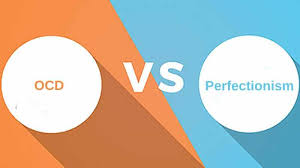Do you excessively worry about making mistakes, and feel the need to be perfect? Do you have intrusive thoughts or images that won’t go away? If so, you may be struggling with OCD or perfectionism. These disorders can be highly disruptive and impairing, but there is help available. In this blog post, we will discuss the symptoms of OCD and perfectionism and how to manage them.
Contents
Understanding OCD And Perfectionism
 It is very important to understand the difference between OCD and perfectionism. Many people think that they are the same, but they are two very different things. OCD is a mental disorder that is characterized by obsessions and compulsions.
It is very important to understand the difference between OCD and perfectionism. Many people think that they are the same, but they are two very different things. OCD is a mental disorder that is characterized by obsessions and compulsions.
Perfectionism, on the other hand, is a personality trait that can lead to obsessive behavior. However, not all perfectionists have OCD. Many people who are perfectionists do not have any mental disorder at all. Also, researchers have found that there is no link between OCD and perfectionism.
Perfectionism is divided into two parts, healthy perfectionism and the other as unhealthy perfectionism. Healthy perfectionism is when a person has high standards but is able to balance them with healthy coping mechanisms. Unhealthy perfectionism is when a person has unrealistic expectations and cannot cope with setbacks. People with unhealthy perfectionism are more likely to develop OCD.
There are many different ways that people can develop OCD. Some people may have a genetic predisposition to the disorder. Others may develop it after experiencing a traumatic event. There is also evidence that suggests that some people may be born with a brain imbalance that makes them more susceptible to developing OCD.
Both conditions can be difficult to manage individually. And when both interact with one another, it can be an even bigger challenge. However, there are some things that you can do to help manage both OCD and perfectionism.
How OCD And Perfectionism Are Connected?
It is believed that OCD and perfectionism are connected because of many reasons. Let’s explore some of the ways that these two conditions may be connected:
Tend to be highly critical of themselves
People who are perfectionists tend to be highly critical of themselves. This can often lead to feelings of inadequacy and insecurity. This can lead to high levels of anxiety and stress, which can in turn trigger OCD symptoms. It is also worth noting that people with OCD often have perfectionistic tendencies.
Tend to procrastinate
Another way that OCD and perfectionism are linked is that people with OCD often tend to procrastinate. This is because they are so afraid of making a mistake or not doing something perfectly that they put it off until the last minute. This can lead to a lot of stress and anxiety, as well as missed deadlines.
Rigid thinking patterns
It is one of the most difficult things to change the way you think. If you grew up with perfectionism or OCD, then your thinking patterns are likely very rigid. This can make it difficult to see other points of view or to be flexible in your thinking. If you’re stuck in a rigid thought pattern, it can feel like you’re stuck in quicksand.
Need for control
 In both situations, a person seems to have an overwhelming need for control. With OCD, a person experiences anxiety or fear related to their obsessions and compulsions. They may feel that if they can just control their thoughts or behavior, they can reduce their anxiety. On the other hand, perfectionists tend to have a strong need for control over their environment and themselves. They often feel that if they can just achieve perfection, they will be happy and fulfilled.
In both situations, a person seems to have an overwhelming need for control. With OCD, a person experiences anxiety or fear related to their obsessions and compulsions. They may feel that if they can just control their thoughts or behavior, they can reduce their anxiety. On the other hand, perfectionists tend to have a strong need for control over their environment and themselves. They often feel that if they can just achieve perfection, they will be happy and fulfilled.
Both OCD and perfectionism can be extremely debilitating and cause a lot of distress. If you think you may be struggling with either one of these, it is important to seek professional help. Treatment can be very effective in helping you manage your symptoms and live a more enjoyable life.
Is Perfectionism A Consequence Of OCD?
OCD is considered a mental illness, and as with any mental illness, there are many possible causes. So, yes it’s possible that perfectionism is a consequence of OCD for some people. But it’s also possible that perfectionism is a cause of OCD for other people. And still, for other people, the two might have nothing to do with each other. It really varies from person to person.
But as far as studies and research go, there isn’t a whole lot out there on the subject of OCD and perfectionism. So we can’t say for sure one way or the other.
What we can say for sure, however, is that OCD and perfectionism share some common symptoms. For example, both tend to involve a lot of anxiety. And both can cause people to spend an excessive amount of time on certain tasks or activities.
Also, perfectionism is a type that comes under certain OCD subtypes, such as checking and ordering. So in a way, you could say that OCD and perfectionism are quite closely related. And it can be hard to tell them apart.
But in the end, it doesn’t really matter whether OCD or perfectionism came first. What matters is getting the help you need to deal with whichever one is causing problems in your life. Therefore, if you’re struggling with OCD or perfectionism, it’s important to seek professional help.
How To Cope With OCD And Perfectionism?
 In life, perfectionism is something that we all strive for. Whether it’s in our work, our relationships, or our personal lives, we want to be the best that we can be. And while there’s nothing wrong with that, for some people, perfectionism can become an obsession.
In life, perfectionism is something that we all strive for. Whether it’s in our work, our relationships, or our personal lives, we want to be the best that we can be. And while there’s nothing wrong with that, for some people, perfectionism can become an obsession.
If you find yourself constantly striving for perfection in all areas of your life, it may be time to take a step back and reassess your priorities. Here are a few tips on how to cope with OCD and perfectionism:
Ask for help from your loved ones
This is one of the most important things you can do. When you’re struggling with OCD and perfectionism, it can be difficult to ask for help. But it is so important to reach out to your loved ones and let them know what you’re going through. Your loved ones can provide you with the support and understanding you need to get through this tough time. Because perfectionism is often driven by a fear of failure, it’s important to have people in your life who will love you no matter what.
Understand your thinking patterns
Perfectionism is often driven by the fear of making mistakes. If you can understand your thinking patterns, you may be able to identify when your perfectionism is getting in the way of your ability to complete a task. For example, if you find yourself spending hours on a project that should only take a few minutes, perfectionism may be to blame. Moreover, this is a process that can be difficult to break out of once it starts.
Identify your triggers
Once you know what your thinking patterns are, you can start to identify your triggers. A trigger is anything- a person, place, thing, or situation- that sets off your obsessive thoughts and compulsions. When you know what your triggers are, you can begin to avoid them or be prepared for them. It is important to remember that you cannot always avoid your triggers, but you can learn how to deal with them in a healthy way. For example, if you are triggered by messiness, you may try to keep your environment clean and tidy.
Try mindfulness
 Mindfulness is a form of meditation that allows you to focus on the present moment. It can be helpful in managing OCD and perfectionism because it allows you to focus on the task at hand without getting caught up in your thoughts. One way to practice mindfulness is to focus on your breath. Breathe in slowly and deeply, then breathe out slowly and deeply. Repeat this process for a few minutes. You can also try focusing on your surroundings and noticing the sights, sounds, and smells around you.
Mindfulness is a form of meditation that allows you to focus on the present moment. It can be helpful in managing OCD and perfectionism because it allows you to focus on the task at hand without getting caught up in your thoughts. One way to practice mindfulness is to focus on your breath. Breathe in slowly and deeply, then breathe out slowly and deeply. Repeat this process for a few minutes. You can also try focusing on your surroundings and noticing the sights, sounds, and smells around you.
Do relaxation techniques
There are many relaxation techniques that can be used to help ease the symptoms of OCD and perfectionism. One popular technique is progressive muscle relaxation, which involves slowly tensing and relaxing different muscle groups in the body. This can help to reduce the overall level of tension and anxiety that you’re feeling.
Another relaxation technique that can be helpful is deep breathing. This helps to slow down your heart rate and can promote a sense of calmness. So, you should try to take some time out each day to focus on your breathing and make sure that you’re taking deep, slow breaths.
Follow a healthy lifestyle
A healthy lifestyle includes maintaining a balance in all aspects of your life. This means:
- eating healthy foods,
- getting regular exercise, and
- getting enough sleep.
It also means managing your stress levels and taking care of your mental health. You can do this by:
- taking breaks when you feel overwhelmed,
- spending time in nature, and
- joining a support group.
This healthy lifestyle can actually be very helpful in managing both OCD and perfectionism. Because it helps you to stay focused and calm, it can reduce the symptoms of OCD. And, because it helps you to accept yourself and your imperfections, it can help you to let go of perfectionism.
Seek professional help
 Professional help is always a good idea when you’re struggling with mental health issues. If you have OCD and perfectionism, there are treatments that can help you manage both conditions. A therapist can help you understand your thoughts and feelings, and develop healthy coping mechanisms. There are several types of therapies that can be effective, including cognitive behavioral therapy, exposure and response prevention, and Acceptance and Commitment Therapy.
Professional help is always a good idea when you’re struggling with mental health issues. If you have OCD and perfectionism, there are treatments that can help you manage both conditions. A therapist can help you understand your thoughts and feelings, and develop healthy coping mechanisms. There are several types of therapies that can be effective, including cognitive behavioral therapy, exposure and response prevention, and Acceptance and Commitment Therapy.
So, if you’re struggling with OCD and perfectionism, try following these tips and seek professional help. You don’t have to suffer from these conditions alone. With treatment and support, you can learn to manage both OCD and perfectionism and live a happy, fulfilling life.
Conclusion
To conclude, OCD and perfectionism are two different but related conditions. OCD can lead to perfectionism and vice versa. Perfectionism can make OCD worse, but there are ways to manage both conditions. If you have OCD and perfectionism, talk to a mental health professional about how to best cope with both.
There’s no shame in seeking help to manage your mental health. If you’re struggling, please reach out to a friend, family member, or mental health professional. You deserve to live a happy and healthy life!
For more information and tips you can contact Therapy Mantra. We have a team of professional therapists who can provide you with the support and guidance you need to recover from this condition. Contact us today to learn more about our services. You can also book an online therapy or download our free OCD treatment app on Android or iOS.


